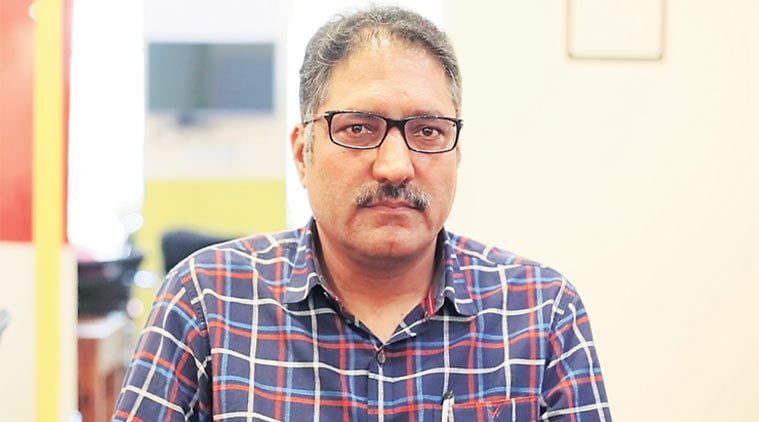Confusion and horror in Kashmir
The United Nations released its first ever report on human rights violations in the Kashmir Valley. It recommends a commission of inquiry into the ‘excessive use of force’ by Indian security forces.

Bukhari edited the daily Rising Kashmir.
The week just ended will be remembered as the week in which the Narendra Modigovernment’s lack of a Kashmir policy imploded horribly. The United Nations released its first ever report on human rights violations in the Kashmir Valley. It recommends a commission of inquiry into the ‘excessive use of force’ by Indian security forces. On the day it was published in full in Rising Kashmir newspaper, its editor Shujaat Bukhari was killed by unnamed killers as he left his office in the heart of Srinagar. His two police bodyguards were also killed. On this same awful day a Kashmiri soldier going home for the Eid holidays was abducted in Pulwama and killed. Once more by unnamed killers.
It was the faceless nature of the killers that brought back for me memories of 20 years ago when Kashmir seemed to be in the hands of faceless terrorists. I was researching a book at the time and went often to Srinagar where I routinely met masked, heavily armed ‘freedom fighters’ in hidden streets in Srinagar, Sopore and Shopian. Usually they remained masked and faceless, but once I met a man with a face and a name in Sopore. He was called Abdul Majeed Dar and his title was adviser general of the Hizbul Mujahideen.
I mention him here not just because he had a name and a face but because of something he said to me when we met on that long ago day. After telling me the usual story about how he had first noticed that he was Kashmiri (and not Indian) because of the way he was treated ‘when I went to India’. ‘If people didn’t treat us as enemies then they treated us as foreigners.’ Then at the end of this interview, as I was about to leave, he asked me if I had watched an interview with Atal Bihari Vajpayee that had been on television the night before. I said I had and that I had heard Atalji say with brutal honesty that if mosques were going to be used as political forums then temples would end up being used the same way. Dar said, ‘Well, we were really impressed with his views and we now feel that a solution to the Kashmir problem will only come if there is a BJP government in power in Delhi.’
Some years later Atalji led the first BJP government in Delhi and he managed, through a policy based on ‘insaniyat, jamhuriat, Kashmiriyat (humanity, democracy and Kashmiri identity), to bring enough peace in the Valley for a tourism boom to begin and for Bollywood to rediscover Kashmir. It was a troubled sort of peace that was constantly sought to be ended by the agents of our neighbourhood Islamic republic. Burhan Wani was one such agent, and so he described himself in his ISIS-style videos as a soldier of Islam who was fighting to make the Kashmir Valley an Islamic state.
He gave enough indications to the governments in Srinagar and Delhi that the nature of the insurgency had changed. This should have meant a change of policy, but somehow this did not happen. So when Narendra Modi first became Prime Minister and attacks began on military bases and security personnel, he decided to respond to violence with violence. There would be no talking to Pakistan, he said, or to jihadists in Kashmir as long as they continued to use violence to make their point. As someone who sees jihadist Islam as the biggest threat of our times I approved of this strategy without noticing that it came without the framework of a policy. It was when the Prime Minister announced in his Independence Day speech last year that all he wanted to do was ‘embrace’ the Kashmiri people that I realised that there was no clear policy. Hugs and the jackboot cannot form part of the same policy, so inevitably when the jihadists saw that there seemed to be confusion in Delhi instead of strategy, they increased their attacks during what was supposed to have been a ceasefire for Ramzan.
It does not help that the Chief Minister of Jammu & Kashmir has seemed more confused than anyone else about how to handle law enforcement. Not only has she swung from one extreme to the other on how to handle this, she has also shown that on the administrative front she has absolutely no idea of how to bring about even the smallest measure of ‘parivartan’ and ‘vikas’. So we now have a situation in which the Kashmir Valley seems once more to be in the hands of faceless terrorist groups instead of in the hands of an elected government. What is truly sad is that this has happened with the BJP ruling not just in Delhi but in Srinagar as well. Abdul Majeed Dar’s prediction was wrong.
For all the latest Opinion News, download Indian Express App
More From Tavleen Singh
- Fifth column: Lies that help ModiModi has made mistakes in the past four years. He has failed to take India in a new economic direction. He wasted time on demonetisation…
- Fifth Column: Bad news for the BJPIf Narendra Modi does not start paying attention to the message that voters in Uttar Pradesh have been trying to send him for months, he…
- Modi’s two biggest mistakes and how he fell into a Congress trapIf only when Rahul Gandhi taunted Modi for running a ‘suit-boot ki sarkar’, he had said that his dream was to ensure that even the…








































No hay comentarios:
Publicar un comentario